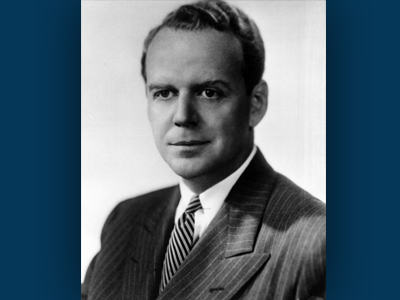Truman Adviser Clark Clifford Opposes State Department on Israel

March 6, 1948
In two detailed memoranda to President Truman, Special Presidential Counsel Clark Clifford emphatically favored both the partition of Palestine and the lifting of an arms embargo imposed on Jewish forces in Palestine. Clifford found himself in direct opposition to the staunchly held views of the State Department, particularly Loy Henderson and George Kennan in the Policy Planning Branch and Secretary of State George Marshall. Clifford wrote the shorter memorandum on March 6 and a lengthier dispatch March 8. Together they were the most forceful pro-Zionist statements by a Truman administration official in the months between the vote on partition in November 1947 and Israel’s Declaration of Independence on May 14, 1948.
Clifford did not want the U.S. to waiver from the U.N. partition resolution, which called for the division of British Mandatory Palestine into Arab and Jewish states, with an economic union between them, and a special international regime for Jerusalem. Partition, he argued, was the only course of action to strengthen America’s position in the region vis-a-vis Russia. He said, “Jettisoning of the United Nations (vote) would be calamitous to American morale.” Clifford told Truman that he was thoroughly opposed to all acts of appeasement that were being made toward the Arabs, particularly the Arab desire to have the U.S. delay the implementation of partition. “Shipments of arms should be freely allowed. … This will give the Jewish militia and Hagana, which are striving to implement the UN decision, equal opportunity with the Arabs to arm for self-defense.” Among other points he made, he argued “that our Arabian oil supplies will not be imperiled if we support the (UN) Assembly’s resolution. The fact of the matter is that the Arab states must have oil royalties or go broke. … Political and economic self-preservation will compel the Arabs to sell their oil to the United States.” Truman, of course, did not back away from supporting partition and Israel’s independence, though the State Department’s pressure on Truman to do so might have succeeded had Clifford not presented his forceful views to Truman.